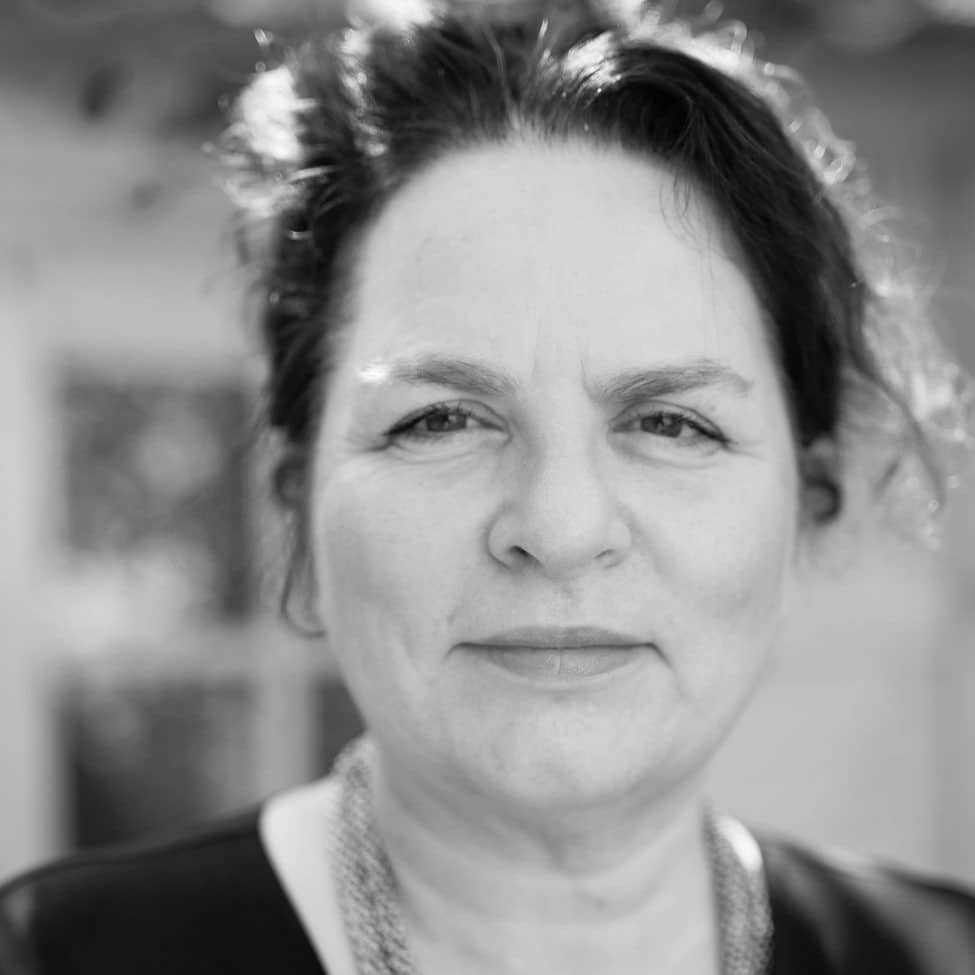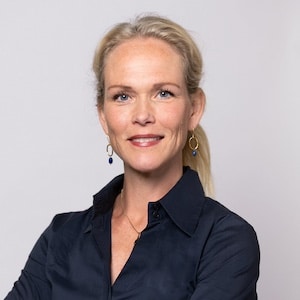Marleen Stikker: ‘I hope the data agreement invites action’
The Metropolitan Region benefits from digitalisation. But technological developments also bring threats: how do we deal with energy-guzzling data centers and how much power do we give big tech? In the Board Talk series, we talk with Board member Marleen Stikker (director of Waag) about the responsible use of data and technology.
Over the past twenty years, Marleen Stikker was one of the few to warn for the flip side of technology and the dangers of big tech. The critical position of artists, hackers and human rights organisations received little support at the time. Meanwhile many are convinced of the fundamental values at stake. “Nowadays it is fortunately a no-brainer to take an active stance on this subject,” says Stikker. “The laws introduced by the European Commission have a major impact, not only the GDPR privacy legislation, but also the Digital Service Act, the Digital Market Act and the AI Act. Added to this are the many lawsuits that, for example, force Google Analytics and ‘behavioural advertisement’ is prohibited. Companies will have to drastically revise their business model. This also offers opportunities for organisations and companies that take public values as their basis. There is now a great demand for it.
Philosopher and internet pioneer Stikker is director of Waag , Futurelab for technology and society that she and Caroline Nevejan founded. It is a platform for artists, designers and developers. Waag has been the maternity room for Fairphone , has set up a network of maker education and maker places, including in the OBA, and is the initiator of the public stack, a roadmap for repairing the Internet. Waag is also involved in the energy transition , including the Internet of Energy, a global movement working on a new model for the energy sector. Over 2.5 years ago Marleen Stikker has been invited to join the board. She received a wildcard because she does not formally belong to a triple helix organisation: the Waag is not a government, company or knowledge institution .
What does your Board membership bring you?
“The nice thing about my membership is the helicopter view it provides. On a number of major issues, such as the energy management of the region, I get new perspectives from knowledgeable people. Another big plus are the new coalitions that are emerging around responsible digitalisation. It’s less easy to do that without such a Board.”
“I joined because I think the Board should develop into a socio-economic board. How can we talk about the future of the region , without having civil society organisations structurally involved? And what do we mean by economics? As far as I’m concerned, we are talking about the household of a city or region and that includes the creation of social value. A healthy household in the Amsterdam region encompasses more than the market and science. The triple helix model, which was implemented based on an OECD recommendation from the previous century, brings governments, the business community and knowledge institutions around the table. This century calls for a different triangle: cooperation between public institutions, such as governments and knowledge institutions, civil organisations and private parties. Public-civil partnerships are underexposed and are crucial for the transitions we are in. In concrete terms for the Board, it means that you have a proportional number of makes seats available for social organisations from domains such as healthcare, housing, culture and work. The discussion about this within the Board is still implicit. I would like us to explicitly discuss which values we consider important and which economic model we use.”
The Amsterdam municipality has been using Kate Raworths donut model, for which you have long been an advocate. This is an economic model in which growth is no longer central and in which a social lower limit and an ecological upper limit are taken into account.
Can the Board also work with this model?
“In Raworths economic vision the commons get a firm place. The economy is also about public values and how we manage joint sources. The city should think about such things now. How to translate that philosophy into future plans, calculation models, output indicators, tender procedures and governance? How to give public-civil cooperation more space? We should also implement this in financial and legal instruments. We operate in a global context. The support for this philosophy can also be found in other regions. The principles for responsible use of data and technology — what we are currently working on — are also based on public values.”
Why is the responsible use of data and technology an important topic for the Amsterdam Metropolitan Area?
“Digitalisation poses major challenges. We have become too dependent on systems, our democracy is being undermined and ownership of data is unclear. At the same time, this digitalisation creates an enormous ecological footprint. A number of Board–members now have a good idea of what is at stake and we are working on a data agreement. The interesting thing is that we are broadening the subject here and thus getting a more integrated picture of digitalisation. I hope that we can show that we are not at the mercy of either China or big tech. We can create a new playing field ourselves by not using Chinese products and not using big-tech platforms. Then you have to think about new revenue models, about new ways of data exchange, such as what AMdEX is working on. At De Waag we also get many questions from SMEs, from retailer associations, delivery services and taxi drivers who cannot compete with the capital-driven and monopoly-oriented platform companies. They need platform cooperatives.”
Read more on how Amsterdam Economic Board works on a responsible digital Metropolis
“Sustainable digitalisation means that you include the entire chain. We are now filling the North Sea with windmills. We need that energy to get rid of the gas. But now it seems that hyperscale data centers are prioritised over local needs. Because both the wind farms and hyperscale data centers of private parties, we have handed over those considerations. If energy is supposed to be a utility function, and we also invest a large part of public money in windmills, why let it fall out of our hands? In addition, maybe we also need to do something with our drift to turn everything into data. Everyone assumes that data maximisation is good, but shouldn’t we be thinking about data minimisation? After all, data remains an interpretation of the world. And what applies to energy also applies to data. That should also be a utility function that is publicly managed.”
What will that data agreement look like in practice?
“I think it’s too early to say anything about that. It can become something that the parties sign. That is the least challenging. I actually hope that we will also set up projects on it in the future and that we will use it to anticipate regulations. Which the agreement really invites action. For example, by formulating what we want with facial recognition or how we store data. We should also take a critical look at the software that use crucial organisations in the region: think of the flood defence, telecom organisations, the municipality. We must not give up our strategic autonomy. I hope that the agreement will ultimately make organisations more resilient, for example because they do not build their business on the wrong foot and run ahead of the troops.”
Text: Mirjam Streefkerk
Portrait picture: Jimena Gauna, Waag, 2022
More Board Talk
The interview with Marleen Stikker is part 15 of the Board Talk series. In this series we talk with Board members about the biggest challenges for the Amsterdam metropolis. A region which offers healthy, sustainable living, responsible digitalisation and meaningful work for everyone. These are also the most important themes for the Amsterdam Economic Board. Read more interviews in the Board Talk series.
14 March 2022
Read more about
Contact us
Want to keep up to date?
Get the best regional news and events (in Dutch) via the Board Update newsletter
Share this news
Want to keep informed?
Follow us daily on LinkedIn and sign up for the Board Update newsletter.
Read more
- On 14 and 15 October, board members of the Amsterdam Economic Board convened for ...
- Focusing more on women in health care innovation and research will have ...
- What is the Amsterdam Metropolitan Area’s position on critical raw materials? ...


